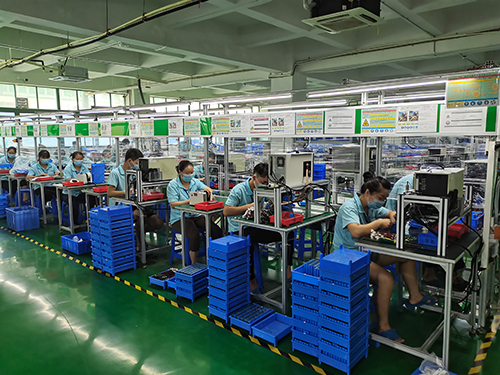Lithium Iron Phosphate Battery: The Pros and Cons of This Efficient Energy Storage Solution
With the increase in demand for renewable energy, energy storage systems have become critical in ensuring a constant and efficient supply of electricity. The lithium-ion battery has been the go-to battery for energy storage systems, but the lithium iron phosphate (LiFePO4) battery has emerged as a reliable and efficient alternative.
In this article, we will explore the pros and cons of the LiFePO4 battery, why it has become a popular energy storage solution, and its potential impact on the renewable energy sector.
Pros of LiFePO4 Battery
1. Safety
One of the most significant advantages of LiFePO4 batteries is their safety. Unlike the lithium-ion battery, which is prone to overheating and catching fire, LiFePO4 batteries are much safer. This is because they have a stable structure that can withstand high temperatures without undergoing thermal runaway.
2. Long lifespan
LiFePO4 batteries have a longer lifespan compared to other types of batteries. They can last up to 2000 cycles, which is approximately four times more than a standard lithium-ion battery. This makes them a cost-effective solution for energy storage systems as they require fewer replacements over time.
3. High energy density
LiFePO4 batteries have a high energy density, which allows them to store more energy in a smaller space. This feature makes them ideal for use in portable devices, electric vehicles, and other applications where space is limited.
4. Fast charging
LiFePO4 batteries can charge rapidly, which is a significant advantage for applications that require quick charging times. Unlike other batteries, LiFePO4 batteries can be charged to their maximum capacity in a short amount of time without causing damage to the battery.
5. Environmentally friendly
LiFePO4 batteries are environmentally friendly as they do not contain toxic metals such as lead or cadmium. They are also recyclable, which makes them a sustainable energy storage solution.
Cons of LiFePO4 Battery
1. Lower energy density compared to lithium-ion batteries
Although LiFePO4 batteries have a high energy density, they have a lower energy density compared to lithium-ion batteries. This means that they may require larger storage systems to store the same amount of energy as a lithium-ion battery.

2. Higher cost
LiFePO4 batteries can be more expensive than other types of batteries. However, their long lifespan and safety features make them a cost-effective solution for energy storage systems in the long run.
3. Lower voltage
LiFePO4 batteries have a lower voltage than other batteries, which may limit their performance in some applications. However, this can be compensated for by connecting several batteries in series to increase the overall voltage.
Konklusion
LiFePO4 batteries have emerged as a reliable and efficient energy storage solution with several advantages over other types of batteries. They offer safety, a long lifespan, high energy density, and fast charging, making them ideal for various applications.
However, they also have some limitations such as a lower energy density compared to lithium-ion batteries, higher cost, and lower voltage. Despite these drawbacks, the benefits of LiFePO4 batteries make them a promising energy storage solution for the renewable energy sector.
-
 Introduction As the demand for renewable energy sources continues to rise, the need for efficient energy storage systems becomes increasingly crucial. Lithium battery power stations have emerged as a promising solution to address the challenges associated with renewable energy storage. These power stations utilize lithium-ion batteries, which are known for their high energy density, long cycle life, and fast...Læs mere
Introduction As the demand for renewable energy sources continues to rise, the need for efficient energy storage systems becomes increasingly crucial. Lithium battery power stations have emerged as a promising solution to address the challenges associated with renewable energy storage. These power stations utilize lithium-ion batteries, which are known for their high energy density, long cycle life, and fast...Læs mere -
 In recent years, electric scooters have gained popularity as a sustainable mode of transportation. With concerns over pollution and the need to reduce carbon emissions, these eco-friendly vehicles have become a preferred choice for commuting in urban areas. At the heart of an electric scooter lies its battery, which plays a crucial role in powering this sustainable transportation option. ...Læs mere
In recent years, electric scooters have gained popularity as a sustainable mode of transportation. With concerns over pollution and the need to reduce carbon emissions, these eco-friendly vehicles have become a preferred choice for commuting in urban areas. At the heart of an electric scooter lies its battery, which plays a crucial role in powering this sustainable transportation option. ...Læs mere -
 Lithium-ion batteries have become a popular choice for various applications, including electric vehicles, renewable energy storage, and portable electronics. Among the various types of lithium-ion batteries, the lithium iron phosphate (LiFePO4) battery stands out for its superior safety, performance, and durability. One such example is the high-capacity 12V 100Ah lithium battery with LiFePO4 technology. This battery is designed to...Læs mere
Lithium-ion batteries have become a popular choice for various applications, including electric vehicles, renewable energy storage, and portable electronics. Among the various types of lithium-ion batteries, the lithium iron phosphate (LiFePO4) battery stands out for its superior safety, performance, and durability. One such example is the high-capacity 12V 100Ah lithium battery with LiFePO4 technology. This battery is designed to...Læs mere -
 1. Technological Innovation Leads the Future As the core component of electric vehicles, the technological innovation of electric vehicle batteries is directly related to the performance and development of electric vehicles. From the early lead-acid batteries to today's widely used lithium-ion batteries, each technological leap has significantly improved the range, charging speed and safety performance of electric vehicles. In the...Læs mere
1. Technological Innovation Leads the Future As the core component of electric vehicles, the technological innovation of electric vehicle batteries is directly related to the performance and development of electric vehicles. From the early lead-acid batteries to today's widely used lithium-ion batteries, each technological leap has significantly improved the range, charging speed and safety performance of electric vehicles. In the...Læs mere -
 As technology continues to advance, our reliance on portable devices grows. Keeping these devices charged and ready to use has become an important part of daily life. This is where the 12V LiFePO4 battery comes in handy. This type of battery is designed to provide safe and efficient power to your devices. LiFePO4 batteries are known for their safety...Læs mere
As technology continues to advance, our reliance on portable devices grows. Keeping these devices charged and ready to use has become an important part of daily life. This is where the 12V LiFePO4 battery comes in handy. This type of battery is designed to provide safe and efficient power to your devices. LiFePO4 batteries are known for their safety...Læs mere -
 With the rapid advancement of technology, the demand for efficient and reliable communication systems has increased significantly. Communication base stations play a crucial role in facilitating wireless communication networks. To ensure uninterrupted communication services, the use of high-performance energy storage systems such as lithium batteries has become essential. This article will discuss the benefits and applications of lithium batteries in...Læs mere
With the rapid advancement of technology, the demand for efficient and reliable communication systems has increased significantly. Communication base stations play a crucial role in facilitating wireless communication networks. To ensure uninterrupted communication services, the use of high-performance energy storage systems such as lithium batteries has become essential. This article will discuss the benefits and applications of lithium batteries in...Læs mere -
 Introduction In recent years, the demand for security monitoring systems has drastically increased due to rising concerns about safety and surveillance. Traditional security monitoring systems relied heavily on wired connections, making them susceptible to power outages and damage to the infrastructure. However, with the advancements in lithium battery technology, security monitoring systems can now be enhanced to provide uninterrupted...Læs mere
Introduction In recent years, the demand for security monitoring systems has drastically increased due to rising concerns about safety and surveillance. Traditional security monitoring systems relied heavily on wired connections, making them susceptible to power outages and damage to the infrastructure. However, with the advancements in lithium battery technology, security monitoring systems can now be enhanced to provide uninterrupted...Læs mere

